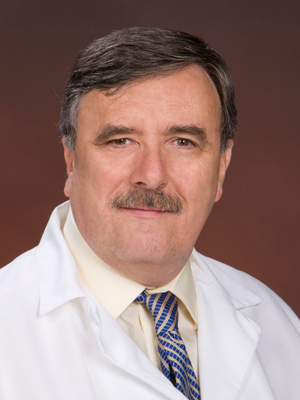Dr. Hermann Mendez: A Trailblazer in Pediatric HIV Care Who Confronted the Epidemic of His Time
 Hermann Mendez, M.D., has been an inspiration to the many physicians he has worked with and mentored over
the years he has been a part of Downstate. He is recognized for his accomplishments
in fighting the HIV/AIDS epidemic in infants and children in Brooklyn from his very
first case in 1981.
Hermann Mendez, M.D., has been an inspiration to the many physicians he has worked with and mentored over
the years he has been a part of Downstate. He is recognized for his accomplishments
in fighting the HIV/AIDS epidemic in infants and children in Brooklyn from his very
first case in 1981.
As my mentor, Mendez directed me into my own professional path working with adolescents with HIV, and I hold a huge sense of gratitude to him for that. Mendez was the first pediatrician in Brooklyn and one of the first in the United States to describe the phenomenon of perinatal HIV infection in infants and young children.
Seeing how HIV and AIDS very quickly spread from a few cases to hundreds of cases across Brooklyn, he knew this as a disease like no other encountered by the medical community before. The legacy to his personal and professional response to the HIV epidemic in infants and children is evidenced today by the many long-term survivors of the disease cared for in a care system for women, infants, children, and youth infected with and affected by HIV across the borough of Brooklyn.
Mendez was born in Guatemala City on April 26, 1949. Due to political unrest in Guatemala, his family moved to El Salvador in 1952, where he grew up and went to school. He graduated from the faculty of medicine, University of El Salvador (1977) and completed three years of postgraduate training in pediatrics there before coming to Downstate in 1980. At Downstate, he continued his pediatric residency training (1980–1983) and also became pediatric chief resident. He completed his joint pediatric/adult medicine infectious diseases fellowship training in 1985 and then engaged in clinical research on maternal infant transmission of HIV until 1988.
In 1989, faced with the many psychosocial issues these patients experienced, Mendez and Joan Hittelman PhD, also of Downstate, applied together to the federal government for funding to establish a network of providers of services for HIV+ infants and children across Brooklyn to coordinate medical care, research, case management, nutrition, and supportive and mental health services for family members both infected and affected by HIV. Their application for a pediatric AIDS demonstration project was successful and their idea came to fruition under the organizational name of the Brooklyn Pediatric AIDS Network (BPAN).
Together with Sheri Saltzberg, who became executive director for BPAN, Mendez implemented the network's services at University Hospital of Brooklyn, Kings County Hospital, Brooklyn Hospital Center, Long Island College Hospital, Brookdale Medical Center, Woodhull Hospital, and St. Vincent's Services for Children, an HIV specialized foster care agency.
In 1992, he added to BPAN the HEAT program to address the needs of adolescents who became infected with HIV through sexual behavior. Renamed the FACES (Family, Adolescent and Children’s Experience at SUNY) Network in 2004, and then later the HEAT PATH Network in 2015, BPAN's work continues today.
Mendez was also committed to research dedicated to fighting the HIV/AIDS epidemic in infants and children, in collaboration with Drs. Sheldon Landesman and Edward Handelsman, he conducted the NIH-funded Women and Infants Transmission Study (WITS), which described the dynamics of perinatal transmission of HIV from mother to infant, enrolling over 400 women and infants. WITS, HIV transmission through the NIH-funded Pediatric HIV/AIDS Cohort Study (PHACS). Through PHACS, he initiated the Surveillance Monitoring for ART Toxicities (SMARTT) protocol, a cohort of HIV+ mothers and their HIV- exposed, uninfected infants, which is studying the long-term effects of exposure to prophylactic antiretroviral medications.
In 1990, Mendez also began Downstate's successful participation in the NIH-funded Pediatric AIDS Clinical Trials Group, which allowed hundreds of infants, children, and adolescents in Brooklyn access to HIV clinical research on the use of new medications in the pediatric population and helped to tum pediatric HTV infection from a death sentence into a long-term chronic disease. Many of his patients today have survived well into adulthood as a result of gaining access to this cutting-edge research.
Today, Mendez is retired and lives both in El Salvador and New York at different times of the year, but remains in touch with so many of his former students, residents, fellow faculty and patients whose lives he impacted for the better.
Written by: Jeffrey M. Birnbaum, M.D., 1986, MPH, Assistant Professor of Pediatrics at SUNY Downstate Health Sciences University; Dr. Birnbaum is also the Principal Investigator and Executive Director of Health & Education Alternatives for Teens (“HEAT”)